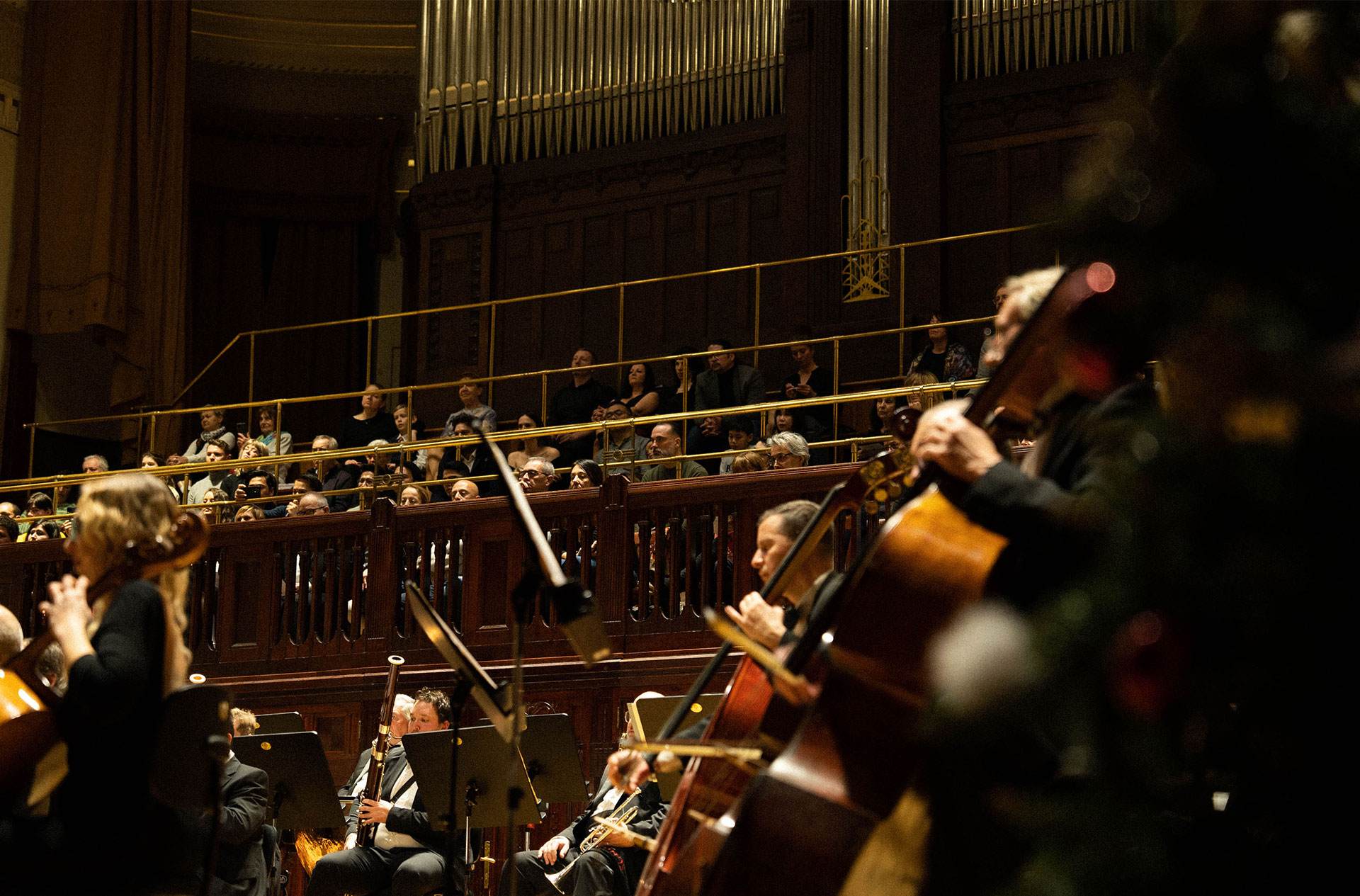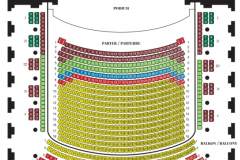Prague Philharmonia
Mo | Tu | We | Th | Fr | Sa | Su |
Program and cast
26th October 2024
Duration of the programme 2 hours
Programme
Bedřich Smetana:
The Secret, overture
Vítězslav Novák:
Slovak Suite, op. 32
Karel Husa:
Serenade for Wind Quintet, Strings, Xylophone and Harp
Antonín Dvořák:
The Golden Spinning Wheel, Op. 109 B 197
Performers
Belfiato Quintet
Emmanuel Villaume: Music Director and Chief Conductor
Prague Philharmonia
24th November 2024
Duration of the programme 2 hours
Programme
Wolfgang Amadeus Mozart:
La clemenza di Tito, Overture, KV 621
Richard Strauss:
Metamorphosen, TrV 290
Ludwig van Beethoven:
Symphony no. 3 in E flat major "Eroica", Op. 55
Performers
Louis Langrée: conductor
Prague Philharmonia
5th December 2024
Duration of the programme 2 hours
Programme
Petr Wajsar:
Building Kit for trombone and chamber orchestra (world premiere)
Felix Mendelssohn-Bartholdy:
Piano Concerto No. 1 in G minor, Op. 25
Antonín Dvořák:
Symphony No. 6 in D major, Op. 60, B 112
Performers
Štěpán Janoušek: trombone
Hyuk Lee: piano
Emmanuel Villaume: conductor
Prague Philharmonia
19th January 2025
Duration of the programme 2 hours
Programme
Wolfgang Amadeus Mozart:
Idomeneo, ballet music, KV 367
Krzysztof Penderecki:
Sinfonietta No.2 for Flute and String Orchestra
Wolfgang Amadeus Mozart:
Flute Concerto No.2 in D major, KV 314
Christoph Willibald Gluck:
Don Juan, ballet music (selection)
Bohuslav Martinů:
Échec au Roi, jazz ballet in one act, H 186
Performers
Stathis Karapanos: flute
Jean-François Ehrlich: narrator
Łukasz Borowicz: conductor
Prague Philharmonia
16th February 2025
Duration of the programme 2 hours
Programme
Louise Farrenc:
Overture No. 2 in E flat major, Op. 24 (czech premiere)
Johannes Brahms:
Violin Concerto in D major, Op. 77
Jean Sibelius:
Symphony No. 5 in E flat major, Op. 82
Performers
Josef Špaček: violin
Gemma New: conductor
Prague Philharmonia
4th March 2025
Duration of the programme 2 hours
Programme
Huw Watkins:
Dawning (Czech premiere)
Dmitri Shostakovich:
Cello Concerto No. 1 in in E flat major, Op. 107
Robert Schumann:
Symphony No. 2 in C major, Op. 61
Performers
István Várdai: violoncello
Angus Webster: conductor
Prague Philharmonia
23th March 2025
Duration of the programme 2 hours
Programme
Luigi Cherubini:
Les Abencérages, overture
Ludwig van Beethoven:
Piano Concerto No. 5 in E flat major "Emperor", Op. 73
Johannes Brahms:
Symphony No. 3 in F major, Op. 90
Performers
Barry Douglas: piano
Emmanuel Villaume: conductor
Prague Philharmonia
27th April 2025
Duration of the programme 2 hours
Programme
Carl Maria von Weber:
Der Freischütz, overture
Richard Wagner:
Symphony in C major, WWV 29
Gustav Mahler:
Das Knaben Wunderhorn, song cycle (selection)
Performers
Nicholas Brownlee: bass-baritone
Emmanuel Villaume: conductor
Prague Philharmonia
18th June 2025
Duration of the programme 2 hours
Programme
Anton Webern:
Passacaglia, Op. 1
Dmitri Shostakovich:
Violin Concerto No. 1 in A minor, Op. 77
Ludwig van Beethoven:
Symphony No. 7 in A major, Op. 92
Performers
Romana Špačková: violin
Emmanuel Villaume: conductor
Prague Philharmonia
Rudolfinum
The Rudolfinum, one of the most noteworthy buildings in Prague, was built between 1876 and 1884 according to the designs of architects Josef Zítek and Josef Schulze. Originally intended as a multipurpose cultural building in Prague, the Rudolfinum was inagurated on February 7, 1885. It carried out its mission until 1919, when it was converted to the House of Commons of the Czechoslovak Republic. Concert activity was restored to the Rudolfinum during the German occupation, but full rehabilitation, particularly of the gallery, did not take place until 1992. After a general reconstruction by architect Karel Prager in 1992, the Rudolfinum became the home of the Czech Philharmonic and the Rudolfinum Gallery.
Dvorana – Ceremony Hall
The central space in the gallery portion of the Rudolfinum was designed by Josef Zítek and Josef Schulz as an entrance hall to the art gallery. After 1918, however, this space was converted into a parliamentary cafeteria, and after World War II it served as a gymnasium for the Prague Conservatory. At the end of the 1980s, Ceremony Hall was threatened with reconstruction – but plans to tear down the main staircase to make room for another concert hall did not go through, and the hall retained its original appearance. Of particular interest in Ceremony Hall are 25 empty spaces on its walls, which were originally intended to be filled in with frescos. The majority of the eminent Czech painters, however, boycotted the 1891 fresco competition in protest over the large number of German artists involved in the construction of the Rudolfinum.
 Dvořák Hall
Dvořák Hall
The Czech Philharmonic took the stage in this world-famous concert hall in 1896, performing for its first-ever concert under the baton of Antonín Dvořák himself. The hall remained a space for concerts and performances until 1918, at which time it became a boardroom for the new parliament of the Czechoslovak Republic. The stage and the organ loft became a tribunal (garnished with a statue of President T.G. Masaryk), from which parliamentary leaders presided over proceedings. The hall's original character (and purpose) was restored
in 1940–1942 according to a project conceived by Antonín Engel and Bohumír Kozák, and it has remained in this form through to the present. In accordance with Josef Zítek and Josef Schulz's original proposal, the central visual element in the hall is an organ, which was made in Frankfurt, Germany. During the hall's stint as a parliamentary meeting place, the organ was housed in Brno. When it returned to the Rudolfinum in 1940, its register was extended. Dvořák Hall's final update took place in 1992 when the entire Rudolfinum building underwent reconstruction.
When travelling by public transport, get off at the Staroměstská metro station (Line A), tram stop (trams nos. 17, 18 and 53) or bus stop (no. 207).
Parking is available at the underground parking facility on Jan Palach Square. The facility is not part of the Rudolfinum premises.

 EN
EN DE
DE IT
IT FR
FR ES
ES RU
RU JP
JP RO
RO
 Seating plan
Seating plan 